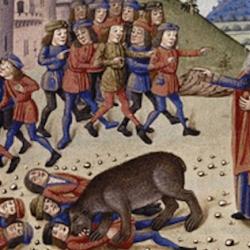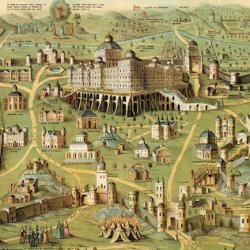INTRODUCTION
Yahweh’s promise to David (2 Samuel 7) about an eternal dynasty overshadows the whole book of Kings, and the story of Kings is about Yahweh’s faithfulness to David in the face of all threats and challenges. Here, David’s dynasty is nearly destroyed by a daughter of Ahab, but Yahweh intervenes to restore David’s house.
THE TEXT
“When Athaliah the mother of Ahaziah saw that her son was dead, she arose and destroyed all the royal heirs. 2 But Jehosheba, the daughter of King Joram, sister of Ahaziah, took Joash the son of Ahaziah, and stole him away from among the king’s sons . . . .” (2 Kings 11:1-21).
TYPOLOGY
Chapter 11 is parallel in many ways to 2 Kings 9-10, the story of Jehu’s coup in the Northern Kingdom. In both, a royal house is slaughtered; in both, a queen is killed; in both, there is a destruction of a temple of Baal (cf. 11:18); in both, someone cries out “Treachery” (9:23; 11:14). In important ways, chapter 11 is a continuation of the Jehu story, because Athaliah is the final member of Ahab’s house to be killed. These similarities bring out important contrasts between the two stories. Jehu actually does kill all the royal seed, but the Lord protects Joash so that the Davidic seed is preserved. Jehu destroys the house of Baal in Samaria, but that is matched by Joash’s faithfulness in restoring the house of Yahweh (12:4-16). As often in Kings, it is clear that Yahweh bestows special care and protection on the house of David, His chosen.
Joash is a new Moses (cf. “nurse” in Exodus 2:7, 9), delivered from the murderous plots of a ruler so that he can later lead Judah out in an “exodus” in the seventh year, leading to rest. His coronation is like a Jubilee, announcing a year of rest and restoration, so that the city can be at peace (v. 20). Joash is also a new Solomon: Both have a contested coronation, both reign for forty years, both work on the temple. Their coronations are described in similar terms (1 Kings 1:38ff.; 2 Kings 11:9-12). Joash, like Solomon (2 Samuel 7) is a son of the High King, Yahweh.
ALL THE ROYAL SEED
The reign of Athaliah is unprecedented in the Southern Kingdom, the first time that a non-Davidic King sits on David’s throne. The author signals the irregularity by avoiding the standard formulae to open and close reigns. It is as if Athaliah never reigned at all; she is an intrusion into the history of Judah. Athaliah’s murder of the royal seed is not only a bloodthirsty act of political violence, but also threatens the fulfillment of Yahweh’s promise to David. Has David’s lamp gone out? Has Jezebel/Baal triumphed over David/Yahweh? The first readers of Kings would have faced these questions as well, for the exile was a massive interruption of the Davidic dynasty. They too would be asking, “Has God word failed?” Yahweh’s triumph over Athaliah demonstrates His covenant faithfulness.
RESTORING DAVID
Jehosheba (“Yah swears”) is a true mother who defies her own mother, Athaliah (2 Kings 9:18, 25; 11:2). She hates her mother for the sake of David’s seed. Like many women in Scripture, she uses deception and subterfuge to protect the seed, turning the serpent’s subtlety against the serpent and his minions (cf. Exodus 2:2). This is a tale of two houses as well as two mothers; the palace is a house of destruction, but there is life and safety in the temple. Jehoiada restores the Davidic kingdom through several steps. First, the restoration requires a new covenant, a complex three-dimensional covenant between the king, the people, and Yahweh. Second, the old regime must be purged. Athaliah is killed at the horse gate (vv. 15-16), reminiscent of her mother’s trampling under Jehu’s horse, and the institutions of Baal worship that she promoted are eliminated (v. 18). Only then does Joash take the throne (v. 19), and only then do Jerusalem and Judah enter into full joy (v. 20). Third, restoration flows from the house of Yahweh. Joash is hidden in the temple (v. 3), and the coronation takes place in the temple (vv. 17-18), with Joash standing beside the “standing-pillar” (a pun in Hebrew) as a signal of Joash’s role as a “pillar” of the people of Israel (and cf. 23:3).















